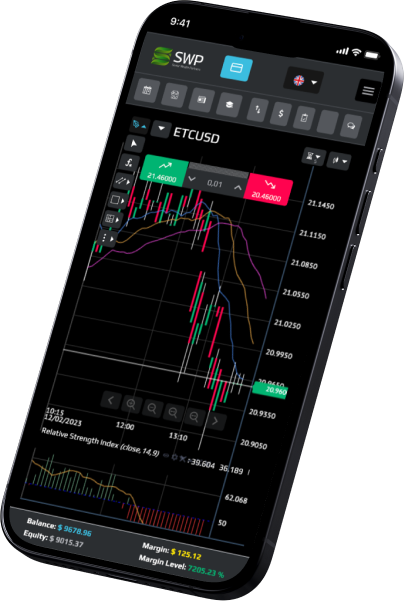Commodities
Take advantage of rapid order execution and narrow spreads through Commodities CFDs trading
*Not all currency pairs are represented here. You can find the entire list on our trading platform

Dive into commodities trading with our platform.
-
Intuitive User Interface
-
Sophisticated Chart Tools
-
Comprehensive Risk Mitigation Features
-
Multi-Window View
-
Variety of Order Options
Explore Crypto Trading Insights
Discover the abundance of educational materials and cutting-edge trading instruments available on our platform.
What is
Commodities
Dive into the complex and varied world of commodities trading, which includes a wide range of goods such as metals, energy sources, farm produce, and soft commodities. Soft commodities are particularly interesting, as they encompass agriculturally produced raw materials like coffee, cocoa, cotton, sugar, and soybeans. This market offers traders the opportunity to engage in the buying and selling of these commodity contracts, aiming to capitalize on their price movements.
Much like the foreign exchange market, the commodities market is traded across various platforms, including futures, options, and contracts for difference (CFDs). Of these, the CFD market stands out as one of the most favored among retail traders, offering them the ease of trading contracts without the need to possess the actual underlying commodity.
In the commodities CFD market, major international banks wield considerable influence, offering their own quotes via electronic trading systems. These quotes are often based on the spot market prices, leading to discrepancies in prices across the market.
Commodity prices are influenced by a multitude of factors, including supply and demand dynamics, geopolitical events, weather patterns, and economic indicators. For example, the price of coffee can be impacted by weather conditions in Brazil, the world's largest coffee producer, while the demand for soybeans may be influenced by the increasing popularity of plant-based diets.
Commodity prices are subject to a plethora of factors, including the interplay of supply and demand, geopolitical shifts, weather phenomena, and economic metrics. For instance, adverse weather conditions in Brazil, the largest coffee producer globally, can impact coffee prices, whereas the rising trend of plant-based diets may affect the demand for soybeans.
The unit of measurement utilized in commodities trading varies for each commodity. For soft commodities, measurements are usually in tonnes, bushels, or pounds. Each commodity has a specific tick size, which represents the minimum price movement. For example, the tick size for cocoa is $1 per tonne.
Similar to forex trading, the spread plays a crucial role in commodities trading. The spread refers to the difference between the bid and ask prices and is influenced by market conditions, volatility, and liquidity. At BTCpantera, we offer narrow spreads on soft commodities CFDs, enabling traders to engage in trading with reduced costs.


